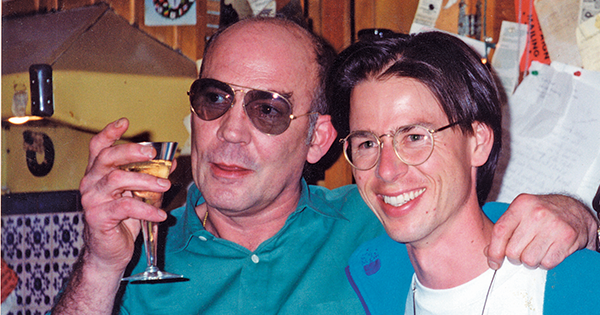
Stories I Tell Myself: Growing Up with Hunter S. Thompson by Juan F. Thompson; Knopf, 288 pp., $26.95
The escapades of Hunter S. Thompson are the stuff of legend. Whether through Garry Trudeau’s comically fictionalized (although not that fictionalized) rendition of Thompson via the indelible Doonesbury comic-strip character Duke, or through Johnny Depp’s portrayal of Thompson in the 1998 feature-film adaptation of Fear and Loathing in Las Vegas, or via the multiple documentary-film accounts of Thompson’s life, the spiky contours of his career are well known. His background in the courtly southern traditions of Louisville, Kentucky. His early success as a writer, which arrived with the publication of Hell’s Angels: The Strange and Terrible Saga of the Outlaw Motorcycle Gang in 1966. His accidental creation, while reporting on the Kentucky Derby in 1970, of the manic, first-person “Gonzo” writing style, as he responded to an impending deadline by ripping raw pages from his notebook and sending them to his editor. His long collaboration with the illustrator Ralph Steadman, who translated Thompson’s hallucinogenic, anti-authoritarian sensibility into expressionist images. His decades-long consumption of epic quantities of nicotine, pot, cocaine, LSD, and alcohol. His status as the sage of Woody Creek, Colorado, outside Aspen, where he once ran for sheriff. His love of guns and of blowing things up. His suicide on February 20, 2005, at age 67.
If you know these basic facts, or have read some of Thompson’s canonical, drug-addled passages, and then you learn that Thompson had a child, an obvious question suggests itself: What must it have been like to be the great and terrible Hunter S. Thompson’s son? The answer, according to Juan Thompson’s affecting new memoir, is in some respects more or less what you would think—and in others, not so much. Instead of an indictment, Thompson’s book is—ultimately, anyway—an expression of love for, and connection with, his father.
Which is kind of astonishing, given the childhood Thompson recounts. A shy, sensitive boy, Juan lived in terror of his father’s unpredictable rages. As Hunter’s marriage to his first wife, Sandy, foundered, Juan would listen to torrid screaming matches between his parents and wake up in the morning to find his mother picking up broken bits of furniture. As a prepubescent boy, helpless in the face of Hunter’s verbal assaults, Juan hated his father “deeply and completely,” so much that he “would have destroyed him if I could have, for my sake and for my mother’s.”
But wait, you’re protesting. I thought you said this book was an expression of love and connection. Amazingly, it is. Juan’s terror and hatred of his father eventually gave way, after decades of estrangement, to forgiveness and reconciliation. To be sure, their relationship was rarely easy, but Juan treasured moments with his father during his later years. Among other things, these included the ritualistic maintenance of Hunter’s collection of firearms. On each visit to Owl Farm (the name of the ranch in Woody Creek), Hunter would select weapons for Juan to clean and then present for his father’s inspection.
In February 2005, Juan, his wife, and their six-year-old son visited Owl Farm for the weekend. Hunter handed him a .45 semiautomatic pistol. “It was no big deal, just another gun that needed cleaning,” Juan writes. The next morning, as Juan’s wife and son played 20 Questions in the living room, Juan “heard a weird cry and a crack,” which he initially thought was the sound of a book falling on the floor. It wasn’t; it was Hunter shooting himself in the head with the same .45 Juan had cleaned the night before.
One could reasonably interpret this scenario as Hunter’s final act of paternal aggression. But Juan doesn’t see it that way. Hunter simply wanted to go out on his own terms. After all, his father “was tapped out,” Juan says. Since his glory days in the ’60s and early ’70s, Hunter’s output had consisted mostly of correspondence, or hackwork, or pieced-together anthologies of his earlier writings. Which means he spent the final 30 years of his life not as the productive writer he’d once been but as the Hunter S. Thompson caricature he’d created—a burden that, along with massive amounts of alcohol and cocaine, sapped his writerly powers.
Moreover, Juan believes that his father’s decision to kill himself during what otherwise would have been a pleasant weekend with his family was a cockeyed act of love—and, though Juan doesn’t explicitly say this, there’s an implication that Hunter’s giving him the job of (unwittingly) preparing the suicide implement was intended to deepen the father-son bond. Some readers may naturally resist this conclusion. But the capaciousness of Juan’s love for his father, despite everything, and his sense of loss at his death incline me to give him the benefit of the doubt.
A book like this implicitly raises the hoary question about the relationship between being a great artist and being a good person. Must the quality of the work and the quality of the behavior necessarily be inverse, as is sometimes supposed? Tolstoy could be a monster to his family, but he created Anna Karenina. Norman Mailer produced an impressive body of work, but he stabbed the second of his six wives. If Hunter had been less devoted to being a writer, could he have been a better father? Stories I Tell Myself makes that question seem stupid. Juan Thompson, in earnestly expressing his desire to be a different and better father than Hunter—while writing this unsparing yet forgiving and affectionate book—evinces an abundant human decency that makes questions about mere art seem trivial. Juan, as he himself readily concedes, is a lesser writer than his father. But he is, despite his persistent concerns about whether he has lived up to his father’s hopes, surely the better man.

